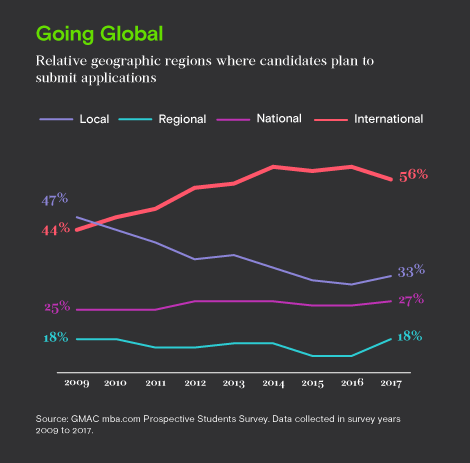
Despite the disruptive effect of the current political climate, most business school candidates still intend to apply to programs outside their country of citizenship.
International application trends in graduate management education have experienced a tumultuous year and a half since the 2016 US presidential election. GMAC’s annual Preliminary Application Trends Survey shows that US business school programs are continuing to see declining interest from international candidates through the first half of the current admissions cycle, with 48 percent reporting fewer international applications compared with the same point last year.
The net result, though, has not necessarily been a large drop off in the percentage of global candidates interested in studying outside their country of citizenship, but a shift in international application sending. As shown in our Chart of the Month for the month of May, a majority of global candidates surveyed between February and December 2017 plan to apply internationally (56%), down just three percentage points from the previous year and still up 12 percentage points from 2009.

The Preliminary Application Trends Survey results show that the primary beneficiaries of this shift in international application sending behavior are business school programs in Europe and Asia-Pacific, who are largely seeing increases in international application volumes. For example, most European Master in Management (87%) and full-time one-year MBA programs report year-on-year international application increases, as well as half of Asia-Pacific full-time two-year MBA programs (50%).
For more on international business school candidates, explore the 2018 mba.com Prospective Students Survey Interactive Data Research Tool (available exclusively to school professionals from GMAT-accepting programs).
Stay up-do-date on the latest trends in international student mobility on our Hot Topics page.

